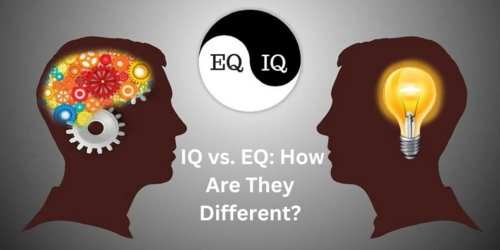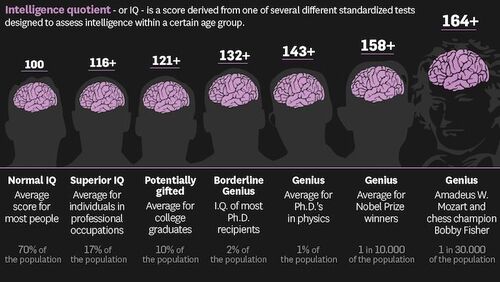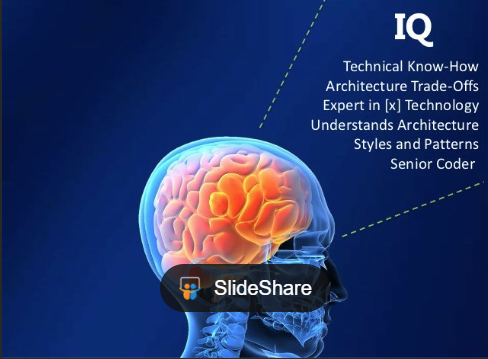
IQ vs. EQ: How Are They Different & Why?

IQ is used to determine academic abilities and identify individuals with off-the-chart intelligence or mental challenges. EQ is a better indicator of success in the workplace and is used to identify leaders, good team players, and people who best work by themselves.
Emotional Intelligence, or emotional quotient (EQ), is defined as an individual's ability to identify, evaluate, control, and express emotions. People with high EQ usually make great leaders and team players because of their ability to understand, empathize, and connect with the people around them. IQ, or intelligence quotient, is score derived from one of several standardized tests designed to assess an individual's intelligence.
What's more important in determining life success—book smarts or street smarts? This question gets at the heart of an important debate contrasting the relative importance of cognitive intelligence (IQ) and emotional intelligence (EQ).
Proponents of so-called "book smarts" might suggest that IQ plays the most critical role in determining how well people fare in life. Those who advocate for the importance of what might be called "street smarts" would instead suggest that EQ is even more important.
This article compares IQ vs. EQ and how the two are different. It also discusses how EQ is measured, potential biases that may exist, and what you can do to improve your EQ.
.png)
Intelligence might seem synonymous with IQ, but it’s not.
The truth is that intelligence is actually pretty multifaceted.
There isn’t only one way to be smart. What’s more, IQ isn’t a very good way of determining how clever you are.
So what is the real difference between your IQ and your intelligence?
Let’s find out.
Even though plenty of us use these two terms interchangeably, they’re not the same thing.
Intelligence is essentially your cognitive abilities in general.
That includes plenty of elements including how well your memory, comprehension, reasoning, abstract thought, and understanding function.
IQ on the other hand is an attempt to measure a certain type of intelligence. It’s a test that tries to gauge and then quantify someone’s overall intellectual ability.
So, your IQ is an attempt to measure your intelligence levels.
It’s a specific number that is based on a sliding scale.
And it comes presented as a score:
Ok, simple enough on the surface.
But this raises plenty of questions to look at.
Questions like:
What does your IQ score even mean? Aka what is it actually measuring?
And who gets to decide what the mark of intelligence is?
So let’s take a deeper look.
The idea of IQ came from Frenchman, Alfred Binet.
He was asked by his government to come up with a test to decipher who might need more help with their education.
It was this that was later developed into the so-called IQ — or intelligence quotient.
Interestingly though, Binet himself didn’t like the name.
Why?
Because he claimed that IQ wasn’t really a test of intelligence.
In fact, all it could measure was a very specific and narrowly defined type of ability.
But the test was soon adopted by American psychologists across the pond, who decided that intelligence was innate.
That means in their eyes, intelligence was something you were born with (or without) and was fixed.
Of course, we would later come to realize this was fundamentally untrue.
Is IQ a good measure of intelligence?
Not really.
As we’ll soon see, intelligence as a whole is far more complex than that.
Which means it’s not so easily categorized.

We’ve already mentioned how IQ looks at one specific form of intelligence.
It is largely focused on abstract intelligence. Meaning, how well you can deal with abstract thinking and reasoning.
As defined by Healthline:
“Abstract thinking is the ability to consider concepts beyond what we observe physically. Recognizing patterns, analyzing ideas, synthesizing information, solving problems, and creating things all involve abstract thinking.”
Abstract thinking is measured during an IQ test through things like:
We use abstract thinking to get our heads around complex concepts.
We see it in daily activities in everything from using metaphors and analogies to solving math problems.
So IQ tests can be a good way to gauge someone’s ability in certain subjects like math, science, and computer science.
But it has some serious limitations.

Let’s put aside for one moment the fact that IQ only measures one form of intelligence.
Perhaps one of the biggest downsides of the IQ test is that it fails to take into account potential.
I mentioned earlier how we have since come to realize that your intelligence depends on your growth and learning, rather than being something that is fixed from birth.
And an IQ test doesn’t account for the fact that if you haven’t been taught certain things, that doesn’t make you less intelligent than someone else.
It does not necessarily make you stupid, it just means you haven’t yet had the chance to learn and practice in the same way someone else may have.
There are certain factors that can impact your IQ score starting in the early years of your life.
Very basic things such as:
The danger of using IQ to measure intelligence starts to become obvious.
If you are one of the sections of society that have gotten left behind, you are deemed as less intelligent.
When really, you simply may have had less opportunity and support.
“IQ is only part of what it means to be smart.”
— Psychologist Jonathan Evans
If asked to, most of us can probably conjure up someone to mind that, despite their intelligence, can often come across as pretty dumb.
Yale School of Management gives the example of George Bush, who throughout his political career had his intelligence called to question.
Despite this, he apparently has an IQ that puts him in the top 10% (120) of the population when it comes to intelligence.
So what gives?
According to Keith Stanovich, professor of human development and applied psychology at the University of Toronto, the problem is (yet again) the deficiencies of IQ in reflecting overall intelligence:
“IQ tests measure an important domain of cognitive functioning and they are moderately good at predicting academic and work success. But they are incomplete. They fall short of the full panoply of skills that would come under the rubric of ‘good thinking’.”
So much so that, as we’ll see next, research has found IQ scores are not a good marker of intelligence at all.
The largest study conducted on IQ concluded that an IQ score cannot show how smart someone is.
Dr. Adrian Owen, the study’s senior investigator, went as far as to say:
“When we looked at the data, the bottom line is the whole concept of IQ — or of you having a higher IQ than me — is a myth. There is no such thing as a single measure of IQ or a measure of general intelligence. We have shown categorically that you cannot sum up the difference between people in terms of one number, and that is really what is important here.”
So what does IQ fail to take into account?
Put simply, other very important aspects of intelligence.
Which according to this particular research study must include at least three fundamental components that make up intelligence:
Intelligence becomes even harder to pin down when we realize that scientists have found different cognitive abilities are related to different circuits in the brain.
This adds weight to the theory that different parts of our brain control different abilities we have.
So the further we dig, the more we see the many avenues of intelligence, and why it is not easy to decide how we should define it.
This will hopefully give you a glimpse into the sheer scale of intelligence:
Scientists have identified over 1000 genes that are implicated in intelligence.
So is it any wonder that it cannot be neatly measured in one singular test?
There isn’t even a universally agreed-upon way of defining intelligence itself.
Roughly speaking it’s your ability to gain and apply skills and knowledge.
And that includes a whole rainbow of talents, abilities, and capabilities.
As soon as we stop and think about it, we recognize it’s not so easy.
I think about all the people I’ve known in life who I may consider “book smart” but totally lacking in so-called “common sense”.
Or those who aren’t going to solve any complex mathematical equations, but go to them with a life problem and they’ll offer you wisdom that would give Ghandi a run for his money.
Personally, I can endlessly debate philosophical ideas, but ask me to try and work the TV and I’m completely stumped.
Anyway, you get my point:
Who decides what intelligence is in order for us to even begin defining it?

Of course, many people certainly have attempted to get to the heart of what intelligence is.
Although up until now, there still isn’t a consensus.
What they do tend to agree upon is that it involves certain mental abilities like reasoning, logic, planning, and problem-solving.
Most definitions think of intelligence as how well we:
And this shows up in many different ways and different types of intelligence — whether that be your emotional intelligence, practical intelligence, etc.
Delving into the complexities of intelligence is enough to make your head spin — regardless of how high your IQ is!
But hopefully, by now it’s at least clear why IQ most certainly is not the same as intelligence.
Because the bottom line is:
We can’t reduce the multifaceted nature of intelligence down to a single number like the IQ score attempts to.
IQ tests are in regular use in education especially, as well as other industries. Proponents of testing cite that it is a standardized assessment that shows intelligence transcends class, measures the need for special education and measures the effectiveness of special training and programs.
IQ testing can also reveal unsuspected talents. But the limitation of these tests is that they provide limited information. They do not test underlying cognitive processes, nor do they predict success at work because they do not encompass non-academic intellectual abilities. Likewise, original or novel responses get marked as wrong even if they show intelligent thinking. Knowing an IQ score may limit children. Finally, IQ tests may reflect bias against minorities or other cultures with certain types of questions.
.jpg)
Andries van Tonder is a Digital Marketer and an Entrepreneur with over 40 Years of experience in Business and Marketing. Business is my passion and I have established myself in multiple industries with a focus on sustainable growth.
You will generally find me online on Facebook, Twitter, WebTalk, Instagram & Markethive
